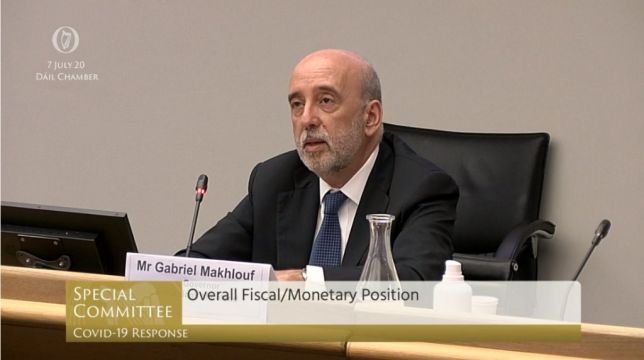The Central Bank of Ireland governor has defended a move to ease mortgage lending rules, which he said will have a “modest” increase on house prices.
The Central Bank announced on Wednesday an easing of some limits in place on mortgage lenders.
Currently, first-time buyers can loan up to 3.5 times their income, but that will rise to four times their income from January.
Gabriel Makhlouf said the benefits of relaxing the rules will “outweigh its costs”.
Today, the Central Bank of Ireland announces targeted changes to lending rules following its overarching review of the mortgage measures framework. https://t.co/d773mOOXpr pic.twitter.com/DbmNwMkcoL
Advertisement— Central Bank of Ireland (@centralbank_ie) October 19, 2022
“The changes that we’re announcing today are likely to have a modest impact on house prices,” Mr Makhlouf said.
“But the reality is, all things are not equal.
“The economy itself, which is slightly slowing down, we’re not forecasting a recession in Ireland, but we are forecasting a slowdown next year compared to last.
“The ECB (European Central Bank) is increasing interest rates, there are many factors that are ultimately going to influence house prices and this one that we’re making, I mean, it’s a modest change, but I think the benefits of the regime that we’re putting in place will outweigh its costs.”
The Central Bank also raised the loan to value limit for those buying for the second time to 90% from 80%.
This puts them in line with the current requirements for first time buyers.
The regulator is also widening the definition of a first-time buyer to include people who are divorced, separated or who have undergone bankruptcy or insolvency.
The decision to make the changes follows a review of the current rules.
Mr Makhlouf told RTE’s News At One that the rules were being felt “most acutely” by first time buyers as opposed to other types of buyers.
These changes come into effect on 1 January 2023. To find out more see: https://t.co/d773mOwObj
— Central Bank of Ireland (@centralbank_ie) October 19, 2022
“We decided that partly for that reason, but also because the resilience of borrowers generally has improved since 2015, the resilience of banks has improved since 2015,” he added.
“We felt we had the policy space to make a targeted change, which would actually reduce the costs of the rules to first time buyers, although still maintain the benefits to the whole economy.”
He added: “What we’re doing is not saying to people, please go ahead and borrow four times your income.
“At the end of the day these rules are essentially guardrails and which set a perimeter within which the banks themselves need to make prudent credit assessments.
“The borrowers themselves need to make sure that what they are borrowing, which is likely to be the most significant financial decision of their lives is something that we’ll be able to manage over their lifetime.”
On the decision to widening the definition of a first-time buyer, Mr Makhlouf said it was a reflection of the way people live their lives.
“One of the pieces of feedback that we had in the consultation led us to conclude that actually the rules needed to recognise the reality in which people were living their lives,” he added.
“They’re going to be considered first time buyers on the assumption of course, they don’t continue to have the original property, but it’s a reflection of the reality in the way people are living their lives today.”

Brian Hayes, chief executive of Banking & Payments Federation Ireland (BPFI) said: “BPFI and its members recognise the critical importance of ensuring the stability of the banking system while providing essential credit to potential home buyers and protecting Irish households from the risk of over-indebtedness.
“The sector recognises the role that the macro-prudential rules have played in ensuring more prudent lending, a reduction in the overall levels of consumer indebtedness, and the establishment of reasonable and transparent requirements expected of customers seeking mortgage approval.
“We support the implementation of the mortgage measures for those important reasons.”







